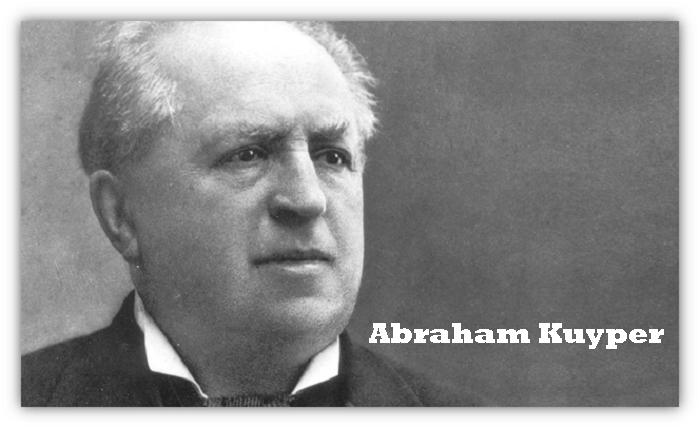Kuyper's Growing Perspective: Politics and Perspective
Kuyper's Growing Perspective: Politics and Perspective

"Now we possess a Program that expresses in words what those in the Anti-Revolutionary circles in our country confess as their principles and that motivates them to apply the truth in a practical political line. By this means our party has an objective basis, no longer merely subjective personal opinions. People no longer have to always go back to the beginning but can build on this foundation."
Dr. Abraham Kuyper made this important observation on the basic relationship between politics and perspective in De Standaard on August 13, 1879. He was writing a series of four articles on the topic of the "Anti-Revolutionary Party after June 1879" that will serve for our present purpose.
Turning-Point⤒🔗
The year 1879 was a turning-point for the AR Party. In the previous April the party had been organized nationally which included the official adoption of the AR Program of principles. Then in June the party had a great victory in the parliamentary elections.
The main principles of this Program were the following: 1) the authority for government (the power of the sword) comes from the sovereign God, not the would-be sovereign people, 2) the party confesses the eternal principles of the Word of God relevant for public life, 3) in a Christian nation, the government is the servant of God in allowing the full expression of the Gospel, 4) government rules by the grace of God and may require the use of the oath in court and keeping Sunday free of normal business, and 5) the independent administration of justice is based on the national ethical consciousness and the eternal principles of law.
This approach is based on the idea of Christian action in a pluralist, constitutional order. Christians have as much right to organize politically as all other groups.
The AR campaign of 1879 was Kuyper's third national contest. As chairman of the party Central Committee and editor of De Standaard, he organized the election of ten lawmakers.
In his first campaign in 1873, the party won 12,600 votes winning five parliamentary seats for a total of eight seats (including three incumbents). In his third campaign, the party took 16,696 votes and won 10 seats for a total of 14 (including incumbents).
During that period the party had almost doubled its number of lawmakers and increased its voter base. At a time when the right to vote was restricted to a small number of men, these numbers, small to us, were significant.
There was thus much popular enthusiasm among party militants: talk of doubling the number of AR seats at the next election, then an AR parliamentary majority and then an AR cabinet! So Kuyper warned his troops to calm down and prepare for long-term work and witness.
The AR leader cited the solid accomplishments that the party had made during that year. First, the AR Program of principles had been adopted. Second, the regional AR papers were unified in their approach. Third, the organization of the voter's clubs throughout the country under the leadership of the party Central Committee. Fourth, the slow but steady increase in AR voters. Finally, the provisional party tactic of emphasizing the seeking of greater grass roots support.

In another article in this series on August 18, journalist Kuyper pointed out that his party had lost six seats to the Liberals by about 650 votes each. In another three towns the Conservatives beat the AR candidates by only a few votes. On August 25 he denied the Liberal press charge that the AR Party wanted to form the government. It would require about 50 experienced statesmen well versed in the AR principles to take on governing responsibility. "We are not ready to form an AR cabinet. Choose paths closer to home," he concluded.
"Influence the grassroots instead of forming a government," was the slogan Kuyper used at the end of his series in De Standaard (September 1, 1879). Emphasis was put upon popularizing the AR principles nationally. In the local AR press, the party voters clubs, political meetings and prayer sessions, Kuyper called on his supporters to inspire the people and unmask the opposition. Too often, he went on, people say they are AR without really knowing what the principles are. We need to know who we are and what we are contending for.
"Following our own political course means that one knows how to confess our own principles, apply the consequences of these principles in state policy and promote these principles on a longterm basis," Kuyper concluded.
Perspective←⤒🔗
It was clear to the readers of this 1879 series in De Standaard that there is a basic relationship between politics and perspective that needs to be promoted among grassroots believers.
This concern with worldview in terms of principles was deepened in Kuyper's lectures at the Free University of Amsterdam in the 1890s and published in 1910 as "Government: The Locus of the Magistrate." The topics of authority and the origin of the magistrate from these lectures will be considered here. "The scriptural expression of sovereignty is having the potter's power," began Kuyper with reference to Jer. 18:2-6, Jer. 19:11 and Ps. 2:9. There is no "natural law" above God for the Bible is our rule, he added, undoubtedly referring to Catholic and Conservative notions of an autonomous natural law rooted in ancient thought.
God's authority is absolute while man's is only derived. From God's authority flow the creational ordinances (or law structures) in the diverse aspects of reality from nature to the family to thought to society. The Bible sheds the proper normative light on how we are to understand these creational laws. For example, the Bible tells us about an orderly universe made by God thus making our study of chemistry or history possible. For example, we are to develop what God has given us in chemistry, farming, manufacturing and politics according to the biblical standard.
"In humanity there is only one choice, to recognize either the will of God or of ourselves," he noted. God never gives man absolute authority for to do so would lead to anarchy due to sin. While Christ has full authority as King of Kings (Rev. 19:16), its delegation is always limited (Rom. 13).

"The concept of governing is always associated with the concept of law because all ruling presupposes a law," the lecturer added. Due to sin, God revealed His law which should be reflected in human law.
Kuyper then presented some reflections on God's ultimate control over the nations in various biblical texts including Prov. 8:15, Dan. 4:32, 1 Ptr. 2:13-17 and Hos. 8:4 in the following propositions:
-
God's creation contains the basics of both human nature and the family finally leading to the state;
-
sin broke the original creational ordinances leading to anarchy;
-
in this inhuman situation groups of people began to seek to live under an orderly rule;
-
David's kingship was a foretaste of the kingship of Christ (Ps. 2:6; Ps. 45:6-7);
-
God gave the office (ambt) of government with subjection to it in the conscience. Ability to exercise executive leadership properly is a gift from God.
Kuyper gave a brief rationale for Christian involvement in politics by declaring, "Groen van Prinsterer saw that Christ came into the world to save it and not to abandon it to itself. If Christ himself determined to be active in the world, then the duty of the child of God the Christian — is to seek to influence the things of the world so that in these matters the honor of God would be realized as much as possible.
Comments←⤒🔗
-
Kuyper developed his worldview in outline form at the beginning of his career. What first appeared in De Standaard was later developed in much more detail. Over the years he wrote many series of articles such as the "Anti-Revolutionary Party after June 1879." These series were worth clipping for future reference, as many readers did at the time. By this method the AR journalist could develop aspects of his worldview and strategy with clarity over time. His thousands of readers were both educated and encouraged by these series.
-
Kuyper wanted to promote his principles unlike many contemporary Christian groups who push issues and tactics but hide their basic religious commitments out of fear of offending someone. But the AR promotion of discussion of the basic connection between politics and perspective was first of all a Christian witness in public life. How much the promotion of this type of discussion is needed today in the public arena and Christian classrooms! His journalistic undertaking helped to create a solid tradition of a thoughtful worldview faith that is still of positive benefit.
-
It was vitally important to show the public that both the ultimate authority for law and the office of government come from God, not men. This is a very controversial notion today since we live in secular cultures where human sovereignty over life is seen as the highest norm. I did it my way, crooned Frank Sinatra and Luciano Pavoratti in "Duets."
-
Kuyper made a thoughtful study of the task of government as an aspect of common grace. An understanding of common grace is a necessary basis for a Christian view of politics that is thoughtful, realistic, yet requiring gifts and experience. Such a deep perspective helped the AR leader deal with difficult political problems in his party, in parliament and as premier. We find here not the last word on this subject but encouragement for us to gain deeper insights into Scripture, creation, history and the political process for God's glory.

Add new comment